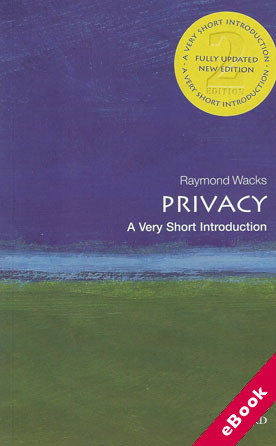
The device(s) you use to access the eBook content must be authorized with an Adobe ID before you download the product otherwise it will fail to register correctly.
For further information see https://www.wildy.com/ebook-formats
Once the order is confirmed an automated e-mail will be sent to you to allow you to download the eBook.
All eBooks are supplied firm sale and cannot be returned. If you believe there is a fault with your eBook then contact us on ebooks@wildy.com and we will help in resolving the issue. This does not affect your statutory rights.
Some would argue that scarcely a day passes without a new assault on our privacy. In the wake of the whistle-blower Edward Snowden's revelations about the extent of surveillance conducted by the security services in the United States, Britain, and elsewhere, concerns about individual privacy have significantly increased.
The Internet generates risks, unimagined even twenty years ago, to the security and integrity of information in all its forms. The manner in which information is collected, stored, exchanged, and used has changed forever; and with it, the character of the threats to individual privacy. The scale of accessible private data generated by the phenomenal growth of blogs, social media, and other contrivances of our information age pose disturbing threats to our privacy. And the hunger for gossip continues to fuel sensationalist media that frequently degrade the notion of a private domain to which we reasonably lay claim.
In the new edition of this Very Short Introduction, Raymond Wacks looks at all aspects of privacy to include numerous recent changes, and considers how this fundamental value might be reconciled with competing interests such as security and freedom of expression.